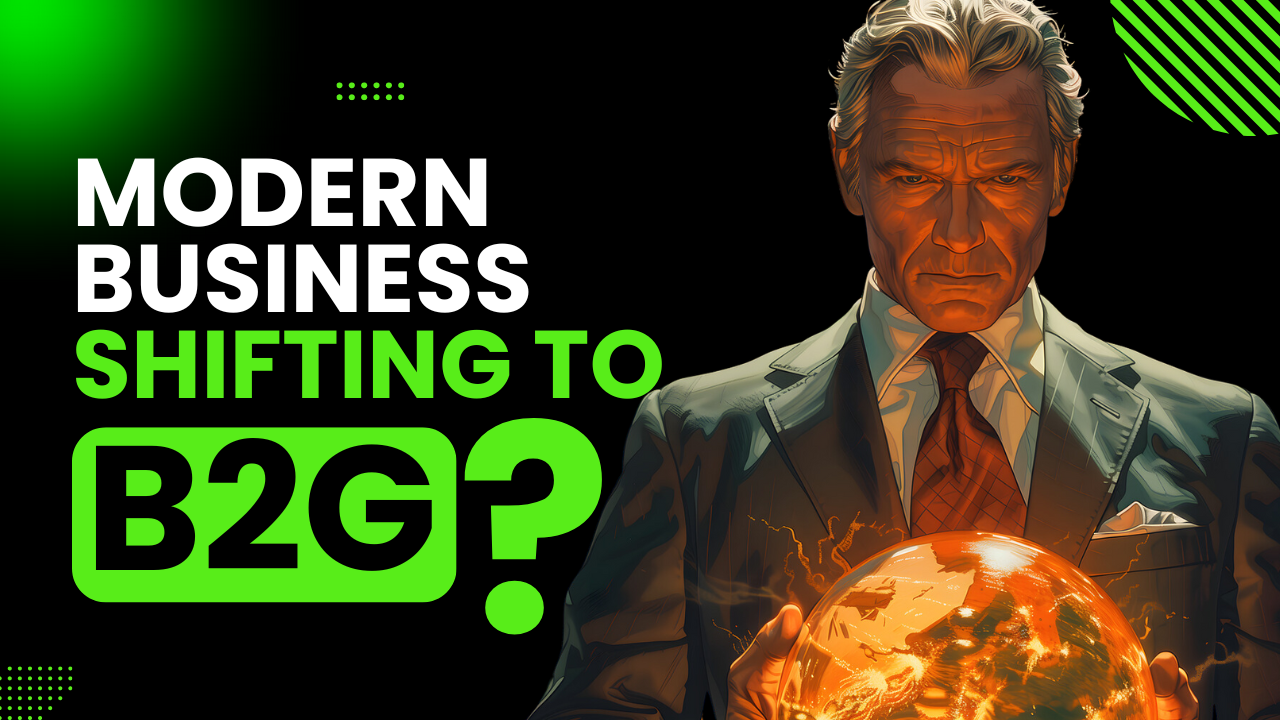
The way businesses approach their sales strategies has shifted considerably over the years. Although many of the traditional lead generation and conversion-optimization strategies may still be effective in B2B (business-to-business) or B2C (business-to-consumer) sectors, government entities require a unique approach.
Introduction
Unlike private sector organizations, government organizations are bound by strict guidelines when sourcing their vendors. This means that businesses need to create a much more distinct approach when targeting government buyers while uncovering new opportunities to stand out from the competition.
More Informed Procurement Teams
Modern government entities are much more unformatted when it comes to their procurement methods. This means that businesses need to work harder in order to stand out from a sea of competitors that offer similar products and services.
In the past, businesses got more attention from government buyers by developing flashy brochures and somewhat aggressive cold-calling tactics. However, today, buyers require a much more personalized approach.
To gain the attention of government procurement teams, businesses need to know how to demonstrate real value beyond their pitches. This requires building relationships built on trust and highlighting the unique experiences you have in the industry and can bring to the table.
Increased Concern About Data Privacy
For a good reason, data privacy has become a primary concern for government organizations. They are under intense public scrutiny when it comes to safeguarding their citizens’ private information, which has unfortunately been amplified due to a variety of successful security breaches and data leaks.
As more organizations continue their digital transformation journeys, the increased digitization of public records makes government entities a prime target for cyberattacks.
This ongoing threat has made it an increased priority for governments to partner with vendors that take cybersecurity seriously and provide the necessary products and services to better protect themselves and their citizens.
Higher Priorities Being Given to Subject Matter Experts (SMEs)
While governments continue to require innovative products and technology solutions, they also want to ensure they’re working with organizations that are experts in their field.
Businesses that can differentiate themselves as subject matter experts (SMEs) have a much higher chance of being noticed and engaged by government buyers. But to achieve this, businesses need to do more than provide great-looking marketing materials or post the occasional helpful blog.
To establish yourself as a trusted SME in your industry, you need to establish authority online. This involves having your website or company featured in respected industry publications and actively contributing to certain associations frequently visited by government contacts.
The Increasing Trend of Public-Private Partnerships (PPPs)
A noticeable trend in the B2G sector is the interesting reliance on public-private partnerships (PPPs). These are collaborative agreements between government agencies and private companies that work together to provide immediate access to important funding and development support for important infrastructure developments for local parks, public transportation networks, and other important projects such as Next Generation 911.

The growing preference for these arrangements underscores the importance of businesses starting to design a more collaborative approach to their pitches and proposed solutions.
Staying Socially Responsible and Eco-Friendly
Government organizations, unlike many private companies, have a high degree of accountability to the public. This extends to how finances are spent and the type of partnerships that are established.
Due to this fact, government entities put a lot of energy into establishing partnerships that demonstrate a strong commitment to important causes, such as building a more sustainable and environmentally-conscious business.
Businesses can successfully position themselves as these types of partners by establishing certain objectives that closely align with the organizations they engage with. This increases the chances of being considered more seriously when bidding on certain projects.
GovTech Industry Disruptions
The rise in GovTech startups is starting to change how traditional procurement is managed in the B2G sector. These new, innovative companies are introducing cutting-edge technologies that provide access to new data sources, streamlined processes, and a wider pool of suppliers.
To remain competitive, businesses should regularly stay updated on the development of these disruptive technologies and proactively explore ways to integrate them into their own offerings. This adaptability is crucial to not only keep pace with the changing market but also to position themselves as forward-thinking partners for government entities.
In-Person vs. Remote Buyer Engagement
Now that we’re living in post-pandemic conditions, there has been a large resurgence in the importance of in-person meetings and business relationship development. Although virtual meetings became an important part of supporting business development efforts during lockdowns, lifting these restrictions over the years has rekindled the value placed on face-to-face interactions with buyers.
This trend extends to the B2G sector, where industry-specific conferences and tradeshows are once again used to help create partnerships between government organizations and private companies.
For businesses operating in the B2G space, prioritizing attendance at these events is a strategic move. They not only provide a platform for generating new leads but also offer insights into upcoming RFP (Request For Proposal) opportunities.
Renewed Importance of Account-Based Marketing (ABM)
Traditional templated marketing strategies often fall short when engaging with modern government buyers. Account-based marketing (ABM) offers a more effective alternative for B2G engagements. This approach involves identifying key decision-makers within the target organization and creating content and outreach efforts to resonate accordingly.
Because of the unique nature of government processes and procurement regulations, ABM initiatives can be particularly impactful when gaining a competitive edge. By addressing these agencies’ specific pain points and priorities, businesses can establish meaningful connections while creating a strong foundation of trust, leading to more successful partnerships.
Customer and Citizen-Centric Services
Another important responsibility for government entities is to ensure that the essential services or public safety solutions they provide for their citizens are user-friendly and accessible. Businesses that are able to align with this need are in a much better position to receive attention from procurement teams.
When you create a more customer- or citizen-centric strategy for both your marketing tactics and the design of your products, you’re able to provide more value overall. Taking the time to highlight how your services can integrated with existing systems or solutions is also another way to create a more compelling proposition with consideration.
Full Transparency and Trust
Government organizations are not only expected to provide transparency on their business dealings and how they spend their budgets, but also when explaining themselves regarding the types of partnerships they choose.
If a government organization decides to partner with a company that has a bad reputation or uses questionable business practices, it can negatively impact its own standing in the community. Having a lack of transparency and trust breeds mistrust, potentially jeopardizing the entire relationship.
To create more successful B2G relationships, establishing clear communication channels and setting realistic expectations regarding service levels are crucial. This proactive approach not only increases the likelihood of contract renewals but also sets the stage for future collaborations.
Establishing and Maintaining Your B2G Relationships
Creating lasting partnerships with government procurement teams requires a strong understanding of the shifting dynamics in the B2G sector.
By being aware of government buyers’ shifting priorities and tailoring your approach to meet their needs, you can improve your appeal as a preferred vendor during RFP evaluations.

Author: Kevin Ruef
Kevin Ruef co-founded 10-8 Systems after exceeding multiple companies’ sales records (both domestically and internationally). With more than a decade in sales, his experience ranges from B2B, B2G, and B2C. Since the company’s start in 2019, Kevin has been responsible for business development, strategic partnerships, and business operations.





